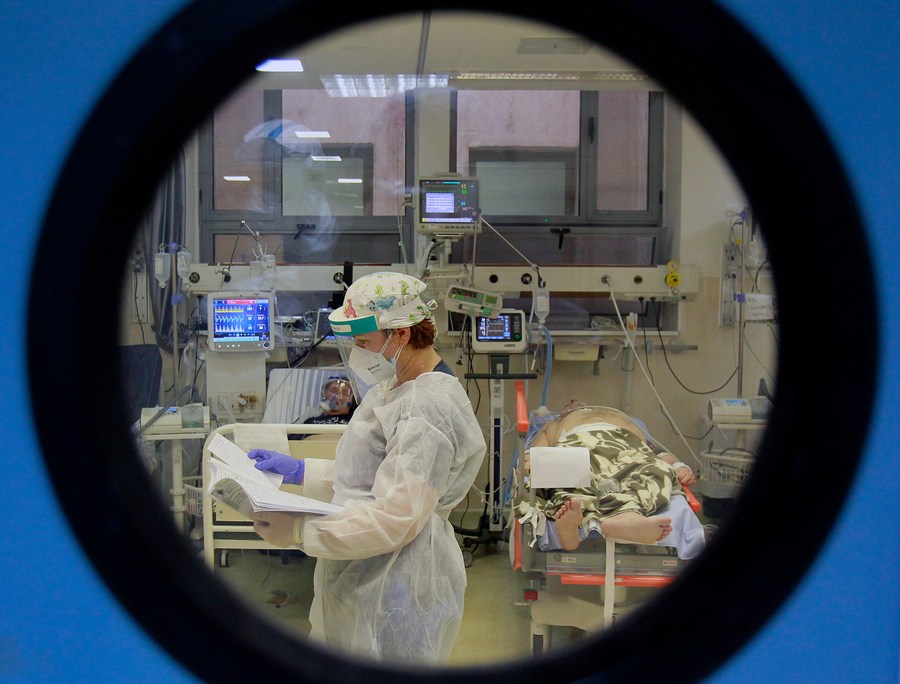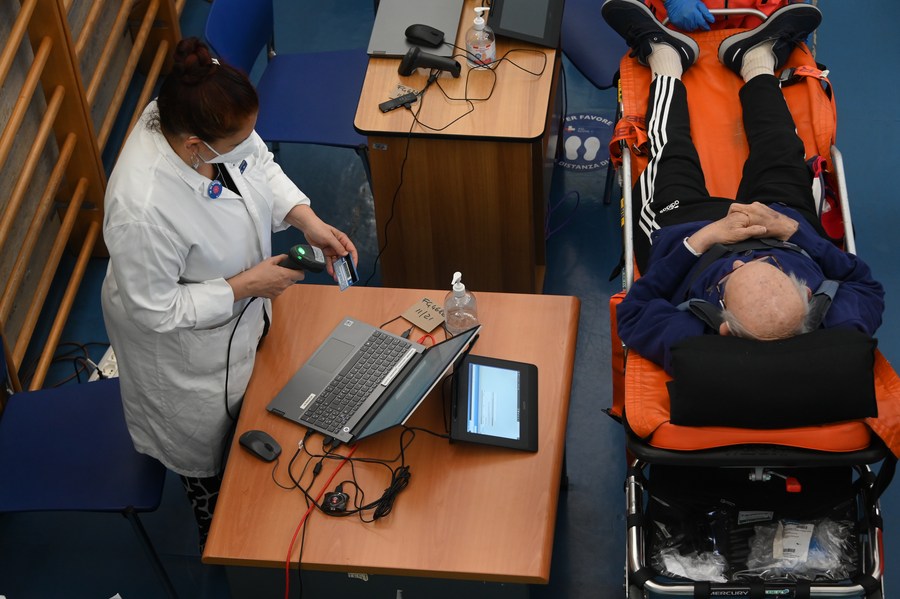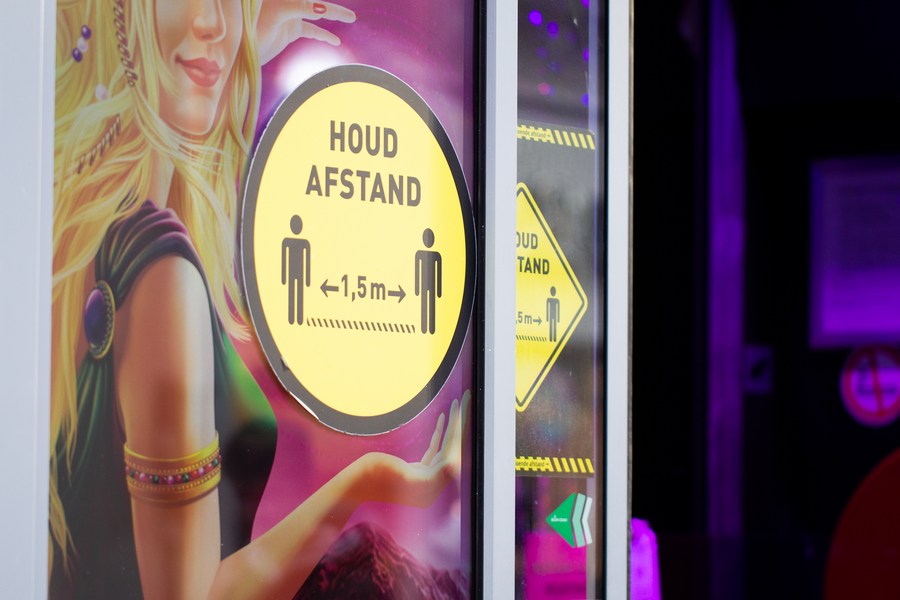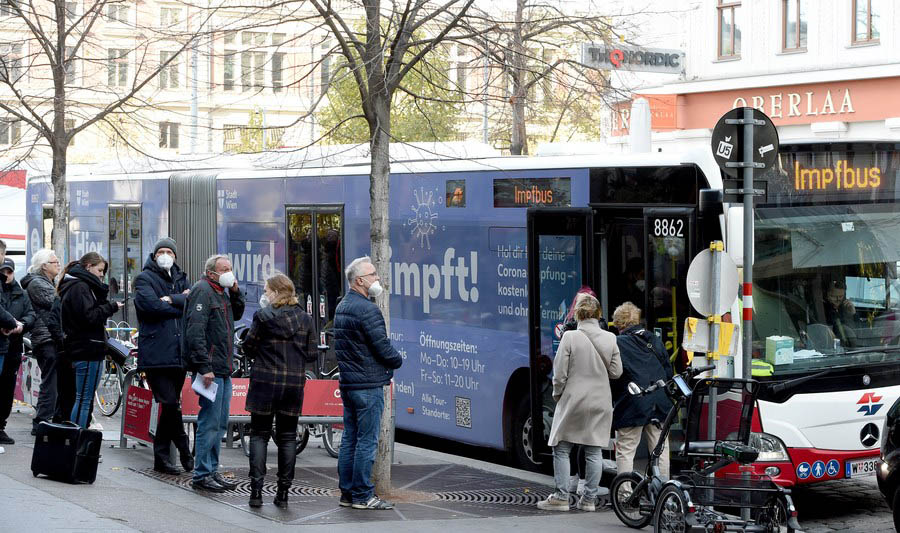Europe forced to tighten restrictions as continent sinks back to pandemic epicenter
-- For the first week of November, Europe reported almost 2 million new COVID-19 infections, the largest weekly case count in the region since the start of the pandemic, while the region also registered almost 27,000 COVID-19-related deaths, more than half of all COVID-19 deaths globally, the WHO said on Friday.
-- Many experts pointed out that the insufficient vaccine roll-out in parts of the region and waning immunity among groups that vaccinated earlier is likely to have contributed to the recurrence. Thus, they called for a rapid booster roll-out, especially for senior citizens and other vulnerable groups.
-- The temporary slowing down of the pandemic over summer may have provided an illusion of safety for some European countries. An easing of social restrictions followed in hopes of boosting largely wounded economies, but infections soared instead.
STOCKHOLM, Nov. 13 (Xinhua) -- A rapid and steady increase of new COVID-19 cases and deaths all across Europe have dragged the continent back to the pandemic epicenter once again since its initial peak last April.
Last week alone, the continent accounted for about two-thirds of the world's 3.1 million newly reported cases and more than half of all COVID-19 deaths globally, World Health Organization (WHO) statistics showed, warning that Europe could face 500,000 more COVID-19 deaths in the next three months following loosened containment measures in the region.
In response to the rapid deterioration, some European countries are forced to announce new measures to push for more jabs and reimpose social restrictions, with more countries expected to follow as the Northern Hemisphere ushers in a darkened winter.
RETURN TO THE EPICENTER
For the first week of November, Europe reported almost 2 million new COVID-19 infections, the largest weekly case count in the region since the start of the pandemic, while the region also registered almost 27,000 COVID-19-related deaths, more than half of all COVID-19 deaths globally, the WHO said on Friday.

A medical worker treats COVID-19 patients in an ICU of the University Emergency Hospital in Bucharest, Romania, Nov. 4, 2021. (Photo by Cristian Cristel/Xinhua)
While other regions showed decreasing trends, Europe is now "the only world region where both COVID-19 cases and deaths are steadily increasing," noted the WHO.
WHO Director-General Tedros Adhanom Ghebreyesus on Friday pointed out an alarming sign that COVID-19 cases have been surging not only in countries with lower vaccination rates in Eastern Europe, but also in Western Europe, home to countries with some of the world's highest vaccination rates.
Meanwhile, the latest weekly surveillance report published by the European Centre for Disease Prevention and Control on Thursday showed that the overall epidemiological situation last week in most European Union (EU) and European Economic Area (EEA) member states are of "high or very high concern."
Last week, the overall COVID-19 case notification rate and the 14-day COVID-19 death rate in the region both increased for five consecutive weeks, with "a high and rapidly increasing overall case notification rate and a low but slowly increasing death rate."
Among countries with some of the most registered daily cases in the region, Germany recorded 50,196 new infections on Thursday, the highest daily surge since the pandemic started, and recorded 48,640 new cases on Friday.
British Prime Minister Boris Johnson said on Friday "storm clouds gathering over Europe" could be seen in Britain, and urged people to take the booster jabs fast, as the country registered 39,325 new cases in the past 24 hours.
"We are at another critical point of pandemic resurgence. Europe is back at the epicentre of the pandemic, where we were one year ago," exclaimed WHO Regional Director for Europe Dr. Hans Henri P. Kluge on Nov. 4, while urging Europe to speed up COVID-19 vaccine coverage and tighten public health and social measures, in response to the worsening situation.
VACCINATION RUSHES
Despite near-record COVID-19 cases in the region, new deaths and cases with severe symptoms are dramatically lower compared with previous peak levels, illustrating the crucial role vaccines play in fighting the disease. Yet despite plenty of doses to go around, vaccine uptake in the region has yet to reach a satisfactory level, while the vaccine rift between Eastern and Western Europe remains concerning.
Many experts pointed out that the insufficient vaccine roll-out in parts of the region and waning immunity among groups that vaccinated earlier is likely to have contributed to the recurrence. Thus, they called for a rapid booster roll-out, especially for senior citizens and other vulnerable groups.
The center for disease control showed that as of week 44, a cumulative uptake of at least one vaccine dose and full vaccination of the total population in the EU and the economic area is 69.5 percent and 64.8 percent respectively. Compared with western countries such as France, Germany and Portugal with vaccination rates well above the EU average, eastern countries such as Romania and Bulgaria are at the bottom, with less than 40 percent and 25 percent respectively.

A recipient gets registered for a COVID-19 booster vaccine at Santo Spirito hospital in Rome, Italy, Sept. 21, 2021. (Photo by Alberto Lingria/Xinhua)
"Most people hospitalized and dying from COVID-19 today are not fully vaccinated," Kluge said, calling for efforts to accelerate the pace of vaccination roll-outs.
In France, while calling on the 6 million non-vaccinated to get the jab to "be able to live normally," President Emmanuel Macron announced on Tuesday that people over 65 years old and vulnerable groups would have to get a booster shot in order to validate their health pass from Dec. 15.
Up north in Norway, with about 70 percent of the population fully vaccinated, the government announced on Friday an expansion of booster shots to those 18 years of age and older in response to the worsening situation in the country; previously only those 65 and older qualified.
Swiss President Guy Parmelin recently renewed calls for citizens to do their part to fight the pandemic in the interest of the country, saying the vaccination rate remains too low to lift restrictions as infections continue rising in Switzerland. "We need solidarity to put an end to this bizarre nightmare," he said.
RESTRICTIONS REIMPOSED
The temporary slowing down of the pandemic over summer may have provided an illusion of safety for some European countries. An easing of social restrictions followed in hopes of boosting largely wounded economies, but infections soared instead.

Photo taken on Nov. 1, 2021 shows a COVID-19 precaution notice asking people to keep 1.5-meter social distance at a shop in Amsterdam, the Netherlands. (Photo by Sylvia Lederer/Xinhua)
Kluge claimed "testing, contact tracing, ventilation in indoor spaces and physical distancing remain part of our arsenal of defences."
He emphasized that countries must change from passively reacting to the infection surges to "actively preventing them from happening in the first place," and that these "tried and tested measures that enable lives to continue while controlling the virus and avoiding widespread, damaging lockdowns."
The Netherlands, which registered 16,364 new cases on Thursday, the highest daily number since the pandemic began, announced a partial lockdown Friday night, with restaurants and grocery stores closed at 8 p.m., sporting events held with empty stands and people encouraged to work from home, making it the first western European country to impose a partial lockdown this winter.
In a dramatic twist, Denmark on Tuesday declared once again COVID-19 as a "socially critical disease" and reintroduced its vaccine passport from Friday on, after the country had declared the virus "no longer a critical threat to society" and lifted all remaining social restrictions only two months ago.

People wait to receive vaccines at a COVID-19 vaccination bus in Vienna, Austria, Nov. 10, 2021. (Xinhua/Guo Chen)
More governments are reportedly busy mulling social restriction measures recently and would probably follow suit, while indecision is seen in some other countries struggling to balance strict lockdowns with economic recovery.
What is happening in Europe despite the availability of vaccines is "a warning shot for the world," said Michael Ryan, executive director of the WHO's Health Emergencies Program recently.
Noting the perception of a near end to the pandemic, Ryan stressed the need to "double down and recommit ourselves to doing everything we can to be the last person in the chain of transmission."
(Xinhua reporters Xing Jianqiao from Paris, Xue Dongmei from Vilnius, Liu Qu, Jiang Xuelan and Chen Binjie from Geneva, Zhang Zhang from Warsaw, Chen Zhanjie from Rome, Guo Shuang from London, Yu Tao from Vienna, Li Jizhi and Pan Geping from Brussels, Lin Jing from Copenhagen, Zhang Yuan from Berlin, Wang Xiangjiang from the Hague also contributed to the story.)
Photos
Related Stories
- Europe once again COVID-19 epicenter: WHO
- China's experience can help the world fight against terrorism in the "post-truth" era
- IMF: China's 2021 growth moderates to 8% as pandemic weakens global recovery momentum
- Europe's natural gas crisis looms amid soaring prices
- Lavrov says Russia ready to help ease Europe energy crisis
Copyright © 2021 People's Daily Online. All Rights Reserved.










